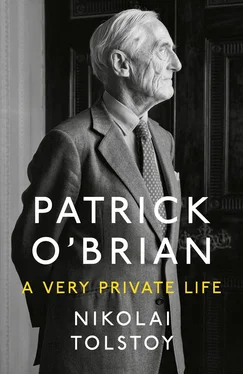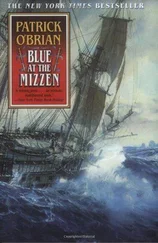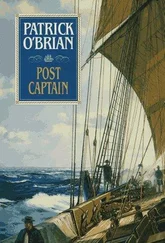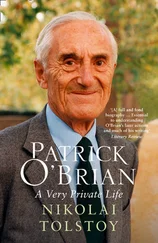His ambitions were clear. Ever averse to dependence on others, he intended to live so far as possible by the work of his hands, while resuming his precocious career as a writer, which five years of war had compelled him to abandon. Prospects appeared as promising as might be. My mother possessed a modest private income on which they were able to scrape by in their two-roomed house at Cwm Croesor in Snowdonia, whose rent amounted to a mere £4 a year. They were fit, resourceful, and unmaterialistic: a perfect team. Neither ever baulked at hard work, and they rarely repined at the constraints of poverty. Over the bitter winter of 1945–46 they laboured undauntedly to make their home habitable, and toiled at their little garden in order to make themselves as self-sufficient as possible in the coming year. Patrick’s shooting and fishing among the mountains and lakes completed their supply of food.
Nevertheless, the spring of 1946 found him increasingly assailed by frustration and pessimism. Try as he would, his pen failed to flow with its former facility. While my mother’s faith in his talent as a writer never wavered, Patrick increasingly experienced prolonged bouts of writer’s block, a condition which by the end of their four years in Wales had all but overwhelmed him. Moving to a larger house nearby in the valley generated only the briefest spasm of revived creativity, and during the winter of 1948 –49 he began to despair of ever fulfilling his consuming ambition. He grew more and more tense, irritable, self-doubting, and agitated by agonizing thoughts of death and dissolution. [1] Конец ознакомительного фрагмента. Текст предоставлен ООО «ЛитРес». Прочитайте эту книгу целиком, купив полную легальную версию на ЛитРес. Безопасно оплатить книгу можно банковской картой Visa, MasterCard, Maestro, со счета мобильного телефона, с платежного терминала, в салоне МТС или Связной, через PayPal, WebMoney, Яндекс.Деньги, QIWI Кошелек, бонусными картами или другим удобным Вам способом.
In addition the long dark wet winters of North Wales imposed debilitating physical gloom over their lives. Eventually he and my mother decided that their only recourse was to effect a total severance with their current unhappy existence.
After living together for six years, in the summer of 1945 Patrick had married my mother, when he further adopted the decisive course of changing his surname from Russ to O’Brian. Contrary to widespread speculation when this was belatedly made public at the end of his life, I have shown elsewhere that he did not select his new name in order to pass himself off as an Irishman. Indeed, the name itself was chosen effectively at random. His overriding motive was to achieve a total break with his past: above all, to banish all association with his selfish and frequently tyrannical father. However, as failure dogged his every effort to extract himself from the grim predicament he found himself facing, he became increasingly troubled by an obsessive fear that his father’s destructive shadow hung over him, frustrating his every effort to break free. Even the rugged recesses of Snowdonia proved too little protection from the hated oppressor, whose presence he sensed looming above him in forbidding screes or tearing down the valley in raging storms, and eventually it seemed that a second flight afforded the only avenue for escape and renewal.
The bleak Welsh winters no longer proffered an invigorating challenge, but exerted a dampening gloom permeating the little household. By the early summer of 1949, the young couple fastened on the south of France, as refuge from the more and more desperate impasse into which Patrick found himself driven. He returned from an exploratory expedition with the exciting news that he had discovered the ideal spot where they could rebuild their lives.
The little town of Collioure lies on the Mediterranean coast, a few miles from the Spanish frontier. Years later, in his broadly autobiographical novel Richard Temple , Patrick provided a vivid sketch of the impression it first made on him:
The village stood on a rocky bay, with a huge castle jutting out into the middle, and a path led round underneath this castle to a farther beach and farther rocks … A jetty ran out at the end of the second beach … and as he walked along the jetty … he took in a host of vivid impressions – the brilliance of the open sea, white horses, the violet shadows of the clouds. From the end of the jetty the whole village could be seen, arranged in two curves; the sun had softened the colour of the tiled roofs to a more or less uniform pale strawberry, but all the flat-fronted houses were washed or painted different colours, and they might all have been chosen by an angel of the Lord … the high-prowed open fishing-boats were also painted with astonishing and successful colours: they lay in two rows that repeated the curves of the bay, and their long, arched, archaic lateen yards crossed their short leaning masts like a complexity of wings. [2] Конец ознакомительного фрагмента. Текст предоставлен ООО «ЛитРес». Прочитайте эту книгу целиком, купив полную легальную версию на ЛитРес. Безопасно оплатить книгу можно банковской картой Visa, MasterCard, Maestro, со счета мобильного телефона, с платежного терминала, в салоне МТС или Связной, через PayPal, WebMoney, Яндекс.Деньги, QIWI Кошелек, бонусными картами или другим удобным Вам способом.
The couple arrived at the town in the beginning of September, which is generally one of the best months of the year on the Côte Vermeille. Tourists had departed, and the little town reverted to its workaday existence. The brilliant sunshine was tempered by a pleasant freshness in the air, with the Pyrenees looming behind the town standing out sharp and clear against a pure azure sky.
During his prefatory visit Patrick had already made a few friends. Among these was a beautiful Colliourencque [fn1] Конец ознакомительного фрагмента. Текст предоставлен ООО «ЛитРес». Прочитайте эту книгу целиком, купив полную легальную версию на ЛитРес. Безопасно оплатить книгу можно банковской картой Visa, MasterCard, Maestro, со счета мобильного телефона, с платежного терминала, в салоне МТС или Связной, через PayPal, WebMoney, Яндекс.Деньги, QIWI Кошелек, бонусными картами или другим удобным Вам способом.
(as the town’s female inhabitants are termed), Odette Boutet. Odette was married to a sculptor and painter named François Bernardi. [fn2] Конец ознакомительного фрагмента. Текст предоставлен ООО «ЛитРес». Прочитайте эту книгу целиком, купив полную легальную версию на ЛитРес. Безопасно оплатить книгу можно банковской картой Visa, MasterCard, Maestro, со счета мобильного телефона, с платежного терминала, в салоне МТС или Связной, через PayPal, WebMoney, Яндекс.Деньги, QIWI Кошелек, бонусными картами или другим удобным Вам способом.
They met again the day after Patrick’s return with my mother, when the two couples immediately became fast friends. During his initial visit Odette had helped Patrick find a small apartement on the second floor of 39, rue Arago, [fn3] Конец ознакомительного фрагмента. Текст предоставлен ООО «ЛитРес». Прочитайте эту книгу целиком, купив полную легальную версию на ЛитРес. Безопасно оплатить книгу можно банковской картой Visa, MasterCard, Maestro, со счета мобильного телефона, с платежного терминала, в салоне МТС или Связной, через PayPal, WebMoney, Яндекс.Деньги, QIWI Кошелек, бонусными картами или другим удобным Вам способом.
situated opposite a great gateway opening through the town wall onto the seafront. There was a living room, bedroom, a windowless nook known as ‘the black hole’, a bathroom with shower, and a tiny lavatory.
Читать дальше












